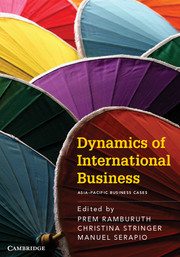Book contents
- Frontmatter
- Dedication
- Foreword
- Contents
- Contributors
- Preface
- Part I The Environment of International Business
- 1 AWB and the Iraqi Oil-for-Food scandal: Just a cost of doing business?
- 2 Walking the blurry line in China: Negotiating deals and staying out of jail
- 3 The feasibility of solar energy in el Junco
- 4 Colombian coffee: Issues of sustainability?
- 5 Preserving paradise: Shell’s sustainable development programs in the Philippines
- Part II Strategy and Entrepreneurship in International Business
- Part III Managing People in International Business
- Part IV Operating in International Markets
- References
1 - AWB and the Iraqi Oil-for-Food scandal: Just a cost of doing business?
Published online by Cambridge University Press: 05 August 2013
- Frontmatter
- Dedication
- Foreword
- Contents
- Contributors
- Preface
- Part I The Environment of International Business
- 1 AWB and the Iraqi Oil-for-Food scandal: Just a cost of doing business?
- 2 Walking the blurry line in China: Negotiating deals and staying out of jail
- 3 The feasibility of solar energy in el Junco
- 4 Colombian coffee: Issues of sustainability?
- 5 Preserving paradise: Shell’s sustainable development programs in the Philippines
- Part II Strategy and Entrepreneurship in International Business
- Part III Managing People in International Business
- Part IV Operating in International Markets
- References
Summary
In 2005, the Australian government initiated an inquiry into ‘certain Australian companies in relation to the UN Oil-for-Food program’, subsequently known as the Cole Inquiry. This inquiry investigated what was to become Australia’s biggest international corruption scandal – the A$300 million paid in kickbacks to the Saddam Hussein-led Iraqi government by the Australian Wheat Board (AWB), an exporting monopoly (Holmes 2006). Even more damning was the fact that this money had been paid to the same dictatorial regime against which Australian soldiers had fought two wars. The seeds of this corruption went back to the introduction of a UN-administered Oil-for-Food Program (OFFP) that was negotiated with the Iraqi government following the First Gulf War.
First Gulf War 1990–91
In 1990, under a government led by Saddam Hussein, Iraq invaded Kuwait. Following an international outcry, a United Nations-endorsed, United States-led coalition force subsequently liberated Kuwait in 1991, in a military action named ‘Operation Desert Storm’. The peace terms required Saddam Hussein to open up Iraq to UN weapons inspectors, including the inspections of sites suspected of being linked to the development of ‘weapons of mass destruction’ (WMDs) (UN Security Council Resolution 687) (Fisher 2004, p. 462). The responsibility for finding weapons, including WMDs, was given to the UN Monitoring, Verification, and Inspection Commission (UNMOVIC) and the International Atomic Energy Agency (IAEA).
- Type
- Chapter
- Information
- Publisher: Cambridge University PressPrint publication year: 2013

